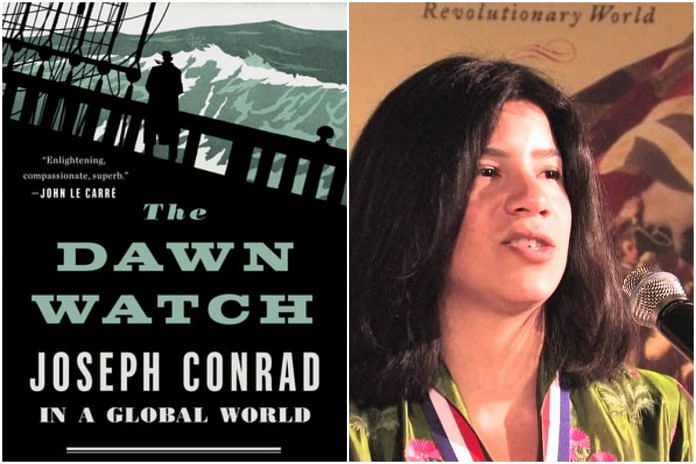In Maya Jasanoff’s book ‘The Dawn Watch’, Joseph Conrad is placed in the context of world politics.
As a reader and a woman of colour, it is quite difficult to make peace with the works of Joseph Conrad. For one, his stories offer a keen insight into the minds of the colonisers but are almost dismissive towards the colonised. Then, there is the glaring absence of women characters in his works. This difficult relationship is, among the first things, addressed by the Harvard historian Maya Jasanoff in her book, The Dawn Watch. It is also this honesty that manages to immediately warm the reader to the book.
Jasanoff refuses to treat Conrad as a mythical personality that he has grown to become. From Chinua Achebe’s lecture on the ‘bloody racist’ Conrad, to Francis Ford Coppola’s Apocalypse Now, a movie loosely based on Conrad’s novel Heart of Darkness, there is no denying the relevance of Conrad’s works in the contemporary world. Such is his aura, that when a friend asked Barack Obama, as to why he was reading this ‘racist tract’, Obama replied, “The book teaches me things… About White people… A particular way of looking at the world.”
However, Jasanoff does not start with that which is already a given. Instead, she treats him as a man who was shaped by his society and his times, all the while respectful of how he, in turn viewed himself as an author.
In the book, he is placed in the context of world politics. From the rule of czars in Poland, in the political environment in which he was born, to the current world of globalization, the author tries to understand him from different perspectives. While his experiences at sea led him to write novels like Lord Jim, Heart of Darkness and Nostromo, he disliked being called a ‘sea author’. So instead, she explores his writing in context to the places he travelled to.
From Australia to Africa, she points out how Conrad’s works reflect the interaction of his travels with his personal experiences. BetweenLord Jim, Heart of Darkness and Nostromo, she crafts a beautiful yet subtle parallel between what he wrote and what he was witnessing around him.
Born as Józef Teodor Konrad Korzeniowski, in a Poland that was under the czarist Russian rule, he was also a traveller who was both at home and without one in the seas, to eventually becoming Joseph Conrad, an English citizen — Jasanoff tugs the complexity in Conrad’s writing with his ever-changing identity markers.
The book quietly answers the accusations levied by Achebe and others on Conrad’s works, all the while respecting their perspective alongside who and where Conrad came from.
There are a myriad of experiences which mark the life of Conrad that have been skilfully furnished by Jasanoff. This includes some landmark moments of his life, such as Conrad’s attempt to suicide, his subsequent embracing of English culture, his marriage and life as a father. Situations and experiences such as getting trapped in central Europe with the outbreak of the World War I while he and his family were on a vacation occupy a special space in the book.
Jasanoff’s writing is empathetic in some parts, and probing, in others. The work is non-fiction but the treatment of the subject is as smooth and structured as any work of fiction. She has shed new light on Conrad whose life and works are, to this day, poked, prodded and mercilessly debated in literary circles.
What Jasanoff successfully puts forth is Conrad’s apt assumption into the future of the globalised world. While the world was rallying around nationalism and democratic socialism, moving away from restrictive imperial regimes, Conrad saw peace as “a reaction to the emerging new order of globalisation”. He described “international socialism” as “the sort of thing to which I cannot attach any definite meaning”
He was of the opinion that the ‘material interests’ will soon overpower any liberal and idealistic beliefs, thereby ensuring that imperialism thrives irrespective of ‘empires’ thriving or not. This belief is paralleled by Kurtz in Conrad’s Heart of Darkness, whose last words, “The horror! The horror!” echo the hollowness of the western idealism that distracts from the glaring reality of imperialism.
From Latin American writers such as Gabriel Garcia Marquez to Ann Patchett; the likes of Graham Greene and John le Carre, Conrad is, at once, a role model to some, and an anathema to others, such as Achebe and V.S. Naipaul. But one thing is for sure, no author is left untouched by the works and beliefs of Joseph Conrad.
Maya Jasanoff’s The Dawn Watch, is a creative and interesting attempt to ignite interest in people to pick up Conrad’s books to decide for themselves. Whether they have already read any of Conrad’s works or not, the book is both captivating and interesting. It also allows one to understand why and how his writing manages to resonate among the reading audience to this day and age.



